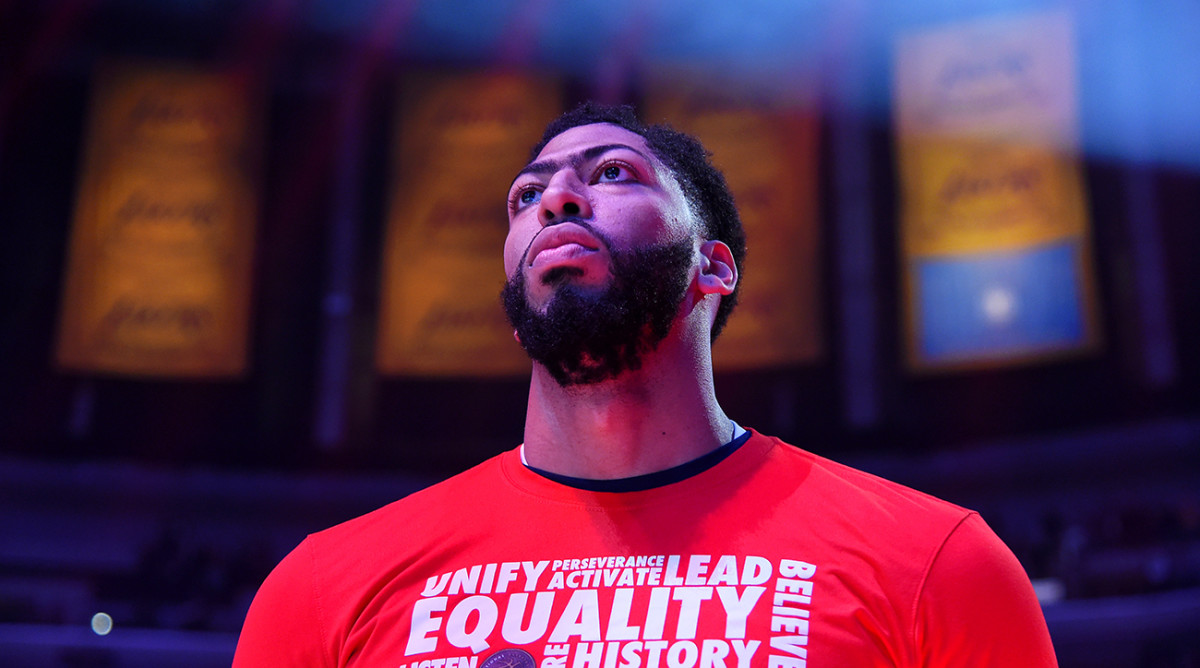No, the Lakers Did Not Give Up Too Much for Anthony Davis

Because it’s 2019 and the Internet is turning my brain into a bowling ball, it’s impossible to know when a narrative is becoming the actual, accepted perception by the majority, or if a group of people yelling about something is resonating nowhere. But after seeing numerous people in my timeline talk about the “risks” of the Lakers’ trade for Anthony Davis—and more than one comparison to the infamous Nets-Celtics of 2013—I had to say this: In no world did the Lakers give up too much for Davis, and the deal was obviously a no-brainer for Los Angeles.
The parallels to the Nets-Celtics deal, in which Brooklyn essentially gave Boston four first-round picks, don’t hold weight for me. First of all, as has been pointed out by many at this point, the Nets acquired old, run-down versions of Paul Pierce, Kevin Garnett, and Jason Terry when Billy King agreed to that move. It was incredibly short-sighted, and with all those players on the wrong side of 35 when the trade happened, Brooklyn was immediately in a position in which its future was compromised, because a group that was in danger of flaming out quickly did exactly that.
It’s not quite the same for the Lakers. Davis is 26 years old. He’s maybe not even in his prime yet? AD has been clamoring to play in Los Angeles and is already reportedly eager to sign a full, five-year max extension with the Lakers next summer. He is almost certainly going to be with this organization for the long haul. Even when LeBron James leaves, Davis will be in L.A. to pick up the pieces and carry the torch for the next iteration of the franchise. The Lakers will likely be in a position to reload once James’s contract is finished. And if they have to stock the roster via free agency and trades, well that’s how they acquired James and Davis in the first place.
I also think the freakout over the draft picks being exchanged is a little over the top. Here’s what’s been reported as changing hands:
A clarification on the haul of draft picks heading the Pelicans' way. The 2021 pick goes to New Orleans if it's in the top eight, if not they'll get an unprotected first in 2022. Swap in 2023. Unprotected first in 2024, with a right to defer to 2025.
— Tania Ganguli (@taniaganguli) June 16, 2019
The Lakers’ 2019 pick, a sheer stroke of luck falling at No. 4, was headed to New Orleans practically as soon as it was announced the night of the lottery. The next pick the Pelicans will receive will almost certainly be in 2022, when Davis will be only 29 and James could be wrapping up his Lakers tenure. Then the teams will pick swap in 2023, which means L.A. will still have a first rounder no matter what. And then the Pelicans get one more pick in 2024 or 2025, when AD will more likely than not still be on the Lakers.

Let’s say L.A. gives up its picks in 2022 and 2024. It would still have first-round selections in 2020, 2021, 2023 and 2025—four of the next six years. Those assets can be moved on draft night if needed to address roster concerns. And if there’s one thing Rob Pelinka has shown an aptitude for, it’s drafting, where he picked up Kyle Kuzma and Josh Hart with later selections, as well as Lonzo Ball in the lottery. Kuzma will be a valuable piece moving forward, and Hart and Ball turned into Davis—the exact kind of asset management people love to froth over when they conjure up scenarios every time a wonky front office starts amassing draft picks.
With the AD trade, the Lakers didn’t only go all-in for the rest of LeBron’s contract, they set themselves up to have a superstar to build around theoretically for the rest of his career. As good as Ball and Ingram have flashed to be, do either of them seem to have the potential to be anywhere near as good as Davis? AD was being discussed as the most coveted superstar to hit the trade market since Shaquille O’Neal, and rightfully so. It was always going to take a massive haul to get him.
Could things go poorly for the Lakers? Sure! But it’s not like the Pelicans are going to be a surefire hit because of this move. The irony of the Davis trade going down now and drawing comparison to the Nets-Celtics deal is that Brooklyn has a chance to overtake Boston this summer. The Celtics’ best subsequent acquisition from the 2013 trade was Jayson Tatum, who the team wouldn’t include in Davis talks. James Young was a bust. Jaylen Brown is very good, but not as good as Kawhi Leonard, who the Celtics didn’t want to trade Brown for. Boston used Brooklyn’s 2018 pick to acquire Kyrie Irving... and now Irving may sign with the Nets after two seasons (and only one playoff run) in Boston. Point being, whatever risk potential there is for the Lakers, the Pelicans now don’t magically have a neatly drawn path to everlasting success.
Amassing assets is smart long-term planning. There’s no argument against that here. But eventually, you have to cash in. Superstars win championships. I’m surprised more people aren’t comparing this Lakers trade to the Kawhi deal the Raptors pulled off. Toronto obviously gave up way less, but if Leonard walks this summer, everyone will still say the trade was worth it. By acquiring Davis, L.A. becomes an immediate championship contender, and has a superstar building block for the next decade. Isn’t that the point? Isn’t that what teams are supposed to do? If the Lakers win a title with the James-Davis duo, will it matter they won’t have a first-round pick in 2025?
L.A. is significantly closer to a championship because of the trade for Davis. In any of the years the Lakers will be giving up first-round picks in the future, I’m confident the front office would rather still have AD than whatever-number selection in the draft. Ultimately, teams need superstars to win trophies. The Lakers now have two, one of whom figures to be with the franchise for many years to come. L.A. has no reason to regret reaching that outcome.
